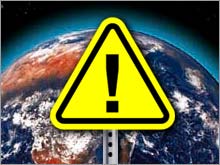|
Global trade: Hostage to terror? Persistent terrorism threats could permanently alter countries' economic and trade patterns, WTO cautions. NEW YORK (CNNMoney.com) -- Terrorism is changing international trade patterns and costing business money. So warns a new report from the World Trade Organization.
And as a result, consumers can expect higher costs as well, experts added. Counter terrorism efforts have become a fact of life for countries around the world. But such measures have imposed additional costs on countries' economies and on international trade, the World Trade 2006 report said. While many governments have taken steps to mitigate this effect, the WTO cautioned that a "country's position in international trade may be permanently weakened if terrorist activities persist and security measures pose a burden on business travel, transport and investment." For instance, the report said these measures are boosting the transaction cost of cross-border trade because of higher insurance premiums and additional screening at borders, sea ports and airports. They're also diverting resources away from some industries like tourism and travel into defense, construction and security services, the report said Countries are investing more money in hiring air marshals or in new computer systems to track cargo ships. For perishable products such as vegetables or fish, trade may have shifted to destinations that can be reached by truck or train, instead. In maritime trade, which is the primary mode of transportation for bulk commodities, the United States implemented a mandatory 96-hour advance arrival notice following Sept. 11. It's the shipping companies that end up absorbing the additional security costs, the report said. Further, the WTO contends that the effect of terrorism are also widely felt both in services merchandise trade since "many forms of international service transactions, such as travel and tourism, require close contact between buyer and seller." The export side of services, such as education, may become more difficult as countries clamp down on freely issuing student visa to international students. Costs will trickle down to consumers Professor Katherine Barbieri with the University of South Carolina has been studying the impact of war and terrorist threats on international trade. After Sept. 11, Barbieri said the U.S. implemented more restrictive procedures regulating goods coming into the country. U.S. companies that do businesses around the world had to comply by the new rules to ensure that each stage of their supply chain was secure. "So much of the burden for security has shifted to businesses," said Barbieri. "A small business in North Carolina that decided to sell products overseas maybe can't absorb these costs as well as bigger corporations. But the penalty for breaking these rules is so high that they might not be able to recover if they do break them." Zoltan Pozsar, economist with Economy.com, said trade's terror premium poses a challenge to global productivity and ultimately to consumers. Pozsar agreed with the WTO report that the higher state of vigilance is forcing countries to reallocate money and labor resources differently, potentially away from some industries and into boosting security infrastructure. Most businesses have probably incorporated the security premium into the final cost of goods sold, thereby passing it along to the consumer. Nevertheless, he doubts those incremental costs will have any significant impact on trade patterns. In fact, some experts suggest that the report by the WTO might even be an attempt by the trade arbiter to lay the groundwork to impose or raise new tariffs and taxes. "What matters to businesses essentially is the cost of capital. Companies will still go where labor cost is the cheapest like China and India," Pozsar said. And those two countries don't appear to be high-risk terror targets, he added. Daniella Markheim, trade policy analyst with the conservative Heritage Foundation, said any world trade fluctuations triggered by security concerns will play out over time. "Depending on the industries, some will have higher costs of doing business. Once you add the terror risks, insurance rates creep up. Those companies who can't cope will cut back on production and sourcing. Prices will go up and consumers on average will be paying more for what they buy," Markheim said. "Right now the impact isn't huge but it could be cumulative over time," she said. |
|

